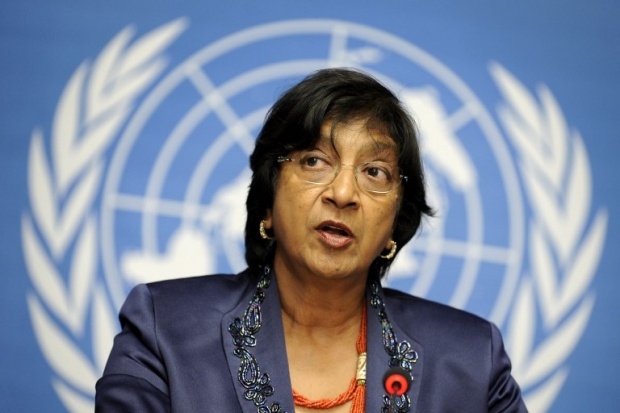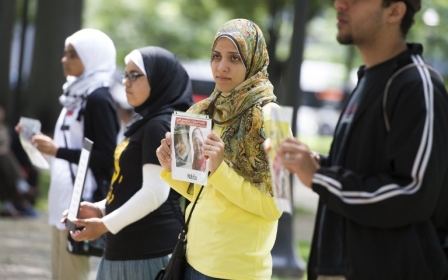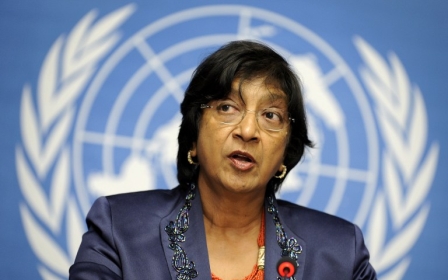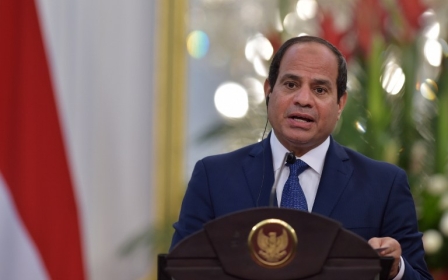Brotherhood delegation urges UN to push Egypt on human rights

In a recent visit to state members of the UN Human Rights Council (HRC) in Geneva, the Freedom and Justice Party (FJP), the Muslim Brotherhood’s political wing, called on the UN to establish a commission of inquiry into Egypt’s human rights situation.
The delegation, which included representatives of the Egyptian Revolutionary Council (ERG) and a legal team of international lawyers, also submitted a 47-page report, prepared by the FJP’s legal representatives, ITN Solicitors, to member states and NGOs detailing recent human rights violations in Egypt.
“Our strategy is to ensure that everyone is aware of the humanitarian situation on the ground in Egypt, even if the Sisi regime turns a blind eye to the international community,” Yahya Hamed, a former minister of investment in the government of ousted president Mohamed Morsi, told Middle East Eye.
“We will continue to put pressure on the regime by disclosing to the world what his happening.”
The visit is a follow-up to the HRC's periodic review of Egypt’s human rights situation in November last year. The review is a tool which the UNHRC uses to assess the human rights records of all 193 UN member states every four years.
During the review in November, several global powers, including the US and the UK, strongly condemned Egypt's human rights record.
"Steps taken by Egypt have resulted in violations of freedom of expression, peaceful assembly and association, deprived thousands of Egyptians of fair trial guarantees, and undermined civil society's role in the country," the US’s UN Human Rights Council representative, Keith Harper said at the time.
Egyptian officials at the review defended the country's record, insisting that the country had been abiding by the rule of law and international treaties despite wave of attacks on its security services. Ibrahim Heneidi, a politician who headed the delegation, said Egypt's new constitution, approved last year, was "a true victory for human rights and freedoms".
'Bad to worse'
The UN working group eventually gave the country 300 recommendations to improve its human rights record, including suggestions related to the country's controversial protest and NGO laws, media freedoms, freedom of association and the use of the death penalty.
This March, Egyptian officials accepted the majority of the UN recommendations, but rights groups said at the time that violations had only worsened.
The FJP delegation in Geneva last week agrees: The situation in Egypt, says the group's report, “has gone from bad to worse” since the review.
ITN Solicitors detailed human rights violations by Egypt including the use of the death penalty, torture and forced disappearances, unfair trials, and the stifling of freedoms of expression and peaceful assembly.
The delegation held discussions with European, African and Asian member states of the UN Human Rights Council as well as various NGOs, Hamed said.
“Most delegations we engaged with understand the risk Egypt and the rest of the region are facing under the current Egyptian regime. This was not under negotiation; it is widely understood and accepted,” he said.
Egypt has a long history of human rights abuses, many of which are seen to have been key grievances behind the popular protests that succeeded in removing president Hosni Mubarak in January 2011 after more than 30 years in power.
While periodic human rights abuses continued, Egypt enjoyed a relative period of improvement following Mubarak’s fall and leading into Morsi’s election in June 2012. Morsi has himself been criticised for trying to crack down on rights and freedoms, but Human Rights Watch has documented what it describes as a serious increase in violations since he was forced from power last July.
Since his overthrow, Egypt has undergone the “most dramatic reversal of human rights” in the country’s history, HRW said in 2014 when the organisation released detailing the involvement and responsibility of Sisi, along with Minister of Interior Mohamed Ibrahim and the head of police special forces in the mass killing of protesters in Egypt during July and August 2013.
The product of a year-long investigation, the report called for the matter to be investigated by the UN, as well by as the Egyptian authorities, and urged that those responsible face justice.
Sisi's anticipated visit to British Prime Minister David Cameron has allegedly been delayed because of security reasons. Senior Egyptian officials could face arrest for crimes against humanity if they take up a UK government invitation to come to London, human rights lawyers told the Guardian on 13 August.
New MEE newsletter: Jerusalem Dispatch
Sign up to get the latest insights and analysis on Israel-Palestine, alongside Turkey Unpacked and other MEE newsletters
Middle East Eye delivers independent and unrivalled coverage and analysis of the Middle East, North Africa and beyond. To learn more about republishing this content and the associated fees, please fill out this form. More about MEE can be found here.




